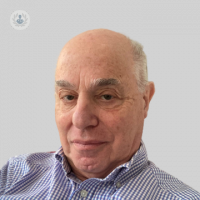What are the causes of persistent cough?
Written in association with:Persistent cough is defined as a cough that lasts for over 8 weeks. In his latest article, Consultant Chest Physician Dr Bryan Sheinman shares his expert insight into this condition. He was a founder member of the British Thoracic Society Specialist Advisory Group, on Persistent Cough. He explains the symptoms, diagnosis and treatment for persistent cough.

What is a persistent cough and what causes it?
A persistent cough is a cough that lasts for over 8 weeks. Frequent causes include unrecognized asthma, reflux disease, post-nasal drip, intolerance to a class of medications used to treat high blood pressure, and eosinophilic bronchitis, a condition that in some respects resembles asthma but is now recognised as a separate illness.
Sometimes investigations take a while, so both patient and doctor need to have patience!
How is a persistent cough diagnosed?
A complete medical history and examination are crucial in the diagnosis of persistent cough. A variety of tests that have undergone scientific validation may also be used by the doctor. Investigations may involve breathing tests, larynx and vocal cord examinations, reflux testing, and CT scans. A drug treatment trial directed at the probable cause may be able to reveal the diagnosis in some circumstances and this is a common course of action.
There remains a group of patients in whom the diagnosis of a recognised condition is not possible and these patients are regarded as having a Chronic Refractory Cough. This notwithstanding, we do have strategies to help these patients.
How is persistent cough treated?
The cause of persistent cough determines the course of treatment. Acid suppressants, medications that help regulate oesophageal contraction, asthma inhalers and Speech and Language Therapy may all be used in conjunction with medications such as amitriptyline, pregabalin, and gabapentin. Low-dose morphine may be quite effective in extreme circumstances. If reflux disease is the underlying reason, dietary and lifestyle modifications may be advised.
When should I see a doctor for persistent cough?
It is now advised to seek medical advice after around 3 weeks in cases of acute cough. By convention, a cough is considered persistent after roughly 8 weeks. Before being referred to a specialist, the majority of individuals with a persistent cough may have visited their GP on more than one occasion and have received one or several tests such as a chest X-ray.

Some individuals may continue to cough for months or even years before a cough specialist is consulted to provide an accurate diagnosis and treatment. It remains true that some patients are extremely challenging or even impossible to help but thankfully this is only a small proportion. Currently, trials are underway to develop new drugs which are very promising in the treatment of persistent cough.
Dr Bryan Sheinman is a senior consultant chest physician with over 30 years of experience. If you would like to book a consultation with Dr Sheinman, you can do so today via his Top Doctors profile.


